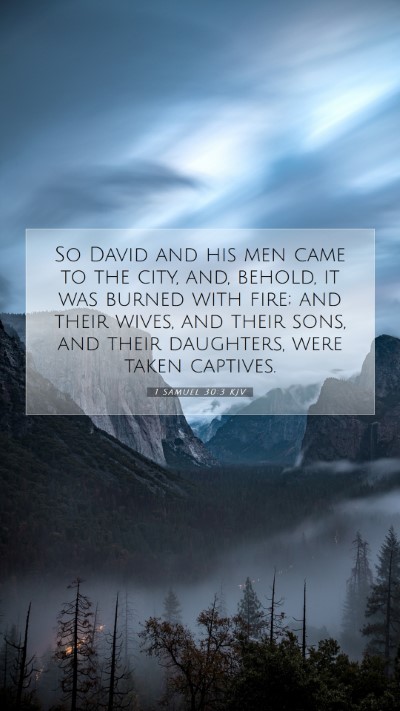Understanding 1 Samuel 30:3
This passage from 1 Samuel 30:3 recounts a critical moment in the life of David as he returns to Ziklag and discovers that the Amalekites have destroyed the city and taken his family captive. Each public domain commentator provides unique insights that deepen our bible verse understanding and illuminate its significance.
Context and Background
In order to properly grasp the meaning of this Bible verse, it is essential to consider the historical context. David, having fled from King Saul, had established his base in Ziklag. At this moment in the narrative, he was away with his men, and upon returning, he found his city burned and his loved ones taken.
Commentary Insights
Matthew Henry's Commentary
Matthew Henry notes that the lamentation of David and his men reflects the depth of their distress and the human condition in facing grievous loss. He emphasizes the idea of mourning, indicating that their tears expressed their love and the severity of the situation.
Key Takeaways:
- The emotion depicted in this passage resonates with the painful realities of loss.
- The devastation experienced highlights the vulnerability of human life and relationships.
Albert Barnes' Notes on the Bible
Albert Barnes elaborates on the importance of Ziklag as a military stronghold and its significance in David's journey. He suggests that the attack by the Amalekites symbolizes external threats faced by the community of believers, akin to the spiritual battles Christians encounter today.
Key Takeaways:
- The attack signifies the ever-present danger lurking against the faithful.
- This verse reflects the reality of being in a vulnerable situation where one's faith may be tested.
Adam Clarke's Commentary
Adam Clarke provides insights regarding the emotional aftermath of the attack. He discusses the inner turmoil among David's men, who not only grieved but also considered blaming David for their misfortunes. This internal conflict can serve as a metaphor for the distractions and doubts believers face in moments of crisis.
Key Takeaways:
- Human nature often seeks to assign blame during times of distress.
- Solidarity and empathy among friends can wane under the weight of grief, revealing the fragile nature of relationships.
Significance of 1 Samuel 30:3 in Scriptures
1 Samuel 30:3 is foundational in understanding the themes of loss, resilience, and eventual restoration. This passage not only captures a moment of despair but also sets the stage for David's comeback and God's faithfulness. Themes of recovery following calamity are recurrent throughout the Scriptures.
Cross References
- Psalm 34:18: "The LORD is near to the brokenhearted and saves the crushed in spirit."
- 2 Samuel 1:11-12: David's lamentation over the death of Saul and Jonathan mirrors his emotional state in Ziklag.
- 1 Chronicles 12:1-2: Highlights the loyalty of David's men, who would later support him in battles.
Application for Today
This passage offers rich bible study insights about how individuals can respond to unexpected calamities. It teaches that during times of grief, communities should come together, support each other, and trust in God's providential care.
Conclusion
In summary, 1 Samuel 30:3 serves as a poignant reminder of the struggles that are a part of life experienced by David and his followers. When studying this verse, we can draw parallels to our current situations, gain strength from David's resilience, and remember the importance of faith in our hardships. Engaging with the insights from public domain commentaries enhances our bible verse interpretations, enriching our understanding of Scripture.


